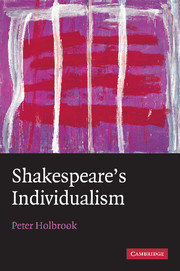Book contents
- Frontmatter
- Contents
- Acknowledgements
- Introduction
- PART I SHAKESPEARE, HAMLET, SELFHOOD
- PART II SHAKESPEARE AND EVIL
- 9 ‘Old lad, I am thine own’: authenticity and Titus Andronicus
- 10 Evil and self-creation
- 11 Libertarian Shakespeare: Mill, Bradley
- 12 Shakespearean immoral individualism: Gide
- 13 Strange Shakespeare: Symons and others
- 14 Eliot's rejection of Shakespeare
- 15 Shakespearean immoralism: Antony and Cleopatra
- 16 Making oneself known: Montaigne and the Sonnets
- PART III SHAKESPEARE AND SELF-GOVERNMENT
- Conclusion: Shakespeare's ‘beauteous freedom’
- Index
- References
11 - Libertarian Shakespeare: Mill, Bradley
Published online by Cambridge University Press: 06 July 2010
- Frontmatter
- Contents
- Acknowledgements
- Introduction
- PART I SHAKESPEARE, HAMLET, SELFHOOD
- PART II SHAKESPEARE AND EVIL
- 9 ‘Old lad, I am thine own’: authenticity and Titus Andronicus
- 10 Evil and self-creation
- 11 Libertarian Shakespeare: Mill, Bradley
- 12 Shakespearean immoral individualism: Gide
- 13 Strange Shakespeare: Symons and others
- 14 Eliot's rejection of Shakespeare
- 15 Shakespearean immoralism: Antony and Cleopatra
- 16 Making oneself known: Montaigne and the Sonnets
- PART III SHAKESPEARE AND SELF-GOVERNMENT
- Conclusion: Shakespeare's ‘beauteous freedom’
- Index
- References
Summary
In the age of the Renaissance the criminal throve and acquired for himself his own kind of virtue – virtue in the Renaissance style, to be sure, virtù, moraline-free virtue.
Nietzsche, Will to Power, 393 (Book Three, Para. 740).‘Pagan self-assertion’ is one of the elements of human worth, as well as ‘Christian self-denial.’
Mill, On Liberty, 69.The notion that Shakespeare was a libertarian-individualist rather than moral author is not new. Nineteenth- and early-twentieth-century critics took this view, which was in part an outcome of Romantic adulation of Shakespeare. Romanticism (‘liberalism in literature’) is committed to freedom. The influence of this perspective on life and Shakespeare is evident in A. C. Bradley's justly influential Shakespearean Tragedy. Published in 1904, the book drew on lectures delivered at Liverpool, Glasgow and Oxford. Bradley belonged to a progressive current in late-nineteenth-century English life. I want to focus here, however, not so much on his socialistic politics as his moral latitudinarianism. Bradley used Shakespeare to foster individualistic, emancipatory tendencies in Victorian civilization. His writing on Shakespeare runs against the era's moralism. Moreover, his use of Shakespeare was not atypical. Shakespeareanism, Elizabethanism more generally, was at this time frequently associated with a relativistic outlook on morality.
The nineteenth century was anxious about the disappearance of individuality in an increasingly anonymous, herd-like society. In 1813 Hazlitt wrote that ‘our distinguishing characteristic [is] the want of all character.’
- Type
- Chapter
- Information
- Shakespeare's Individualism , pp. 124 - 136Publisher: Cambridge University PressPrint publication year: 2010



